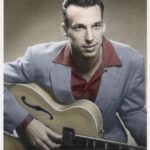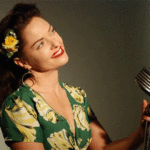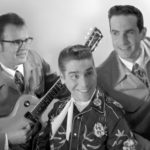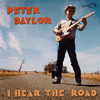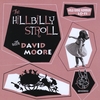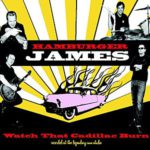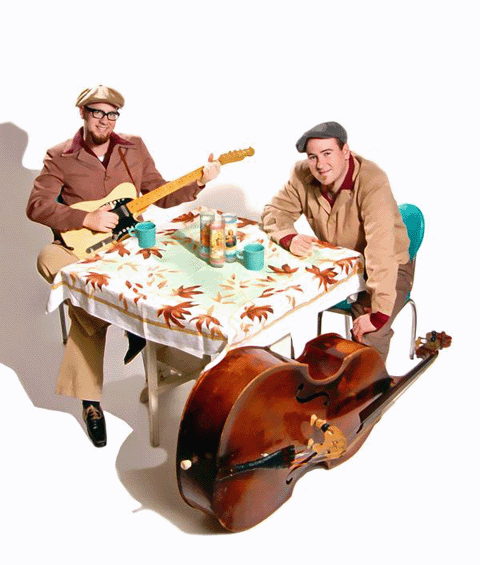
The Horton Brothers
[Archive from 2001]
Brothers duets have a long tradition in country music (Louvin, Monroe, Kershaw to name a few) but there wasn’t many of them (and there are still not many) in the late nineties when the Horton Brothers appeared on the scene with their debut album «Hey It’s Bobby & Billy».
In 1997 Billy (upright bass) and Bobby (guitar) – both sing harmonies or lead – started a band with Derek Peterson (from Kidd Pharaoh, one album on Rock-a-billy records) on rhythm guitar and Alberto Tello on drums. But Alberto had to go back to Italy, so he was replaced by Shaun Young. They soon added a piano to their line-up with the talended T. Jarrod Bonta.
It was time for them to record their first album (vinyl only, hope it will be reissued soon on cd) for Crazy Love (a german label). The Horton Brothers then recorded an EP on Ecco-fonic more representative of their taste. Two albums followed, where they defined their style made of a mix of hillbilly harmonies, rockabilly, texas swing. But this boys doesn’t limit their talent to the Horton Brothers. Billy played with The Asylum Street Spankers, The Hot Club Of Cowtown and produced and recorded many good albums at the now famous Fort Horton Studio. Bobby lent his talent to the Jive Bombers, Deke Dickerson and made an instrumental album with Dave Biller.
After a relativly long period without any release, the Horton Brothers released «Tempo for two» on Texas Jamboree in 2005.
Fred “Virgil” Turgis
First let’s talk about you. Where do you come from ?
Billy Horton: We were born and raised in Beaumont, TX
When did you start playing music and what is your musical background?
Billy Horton: I started playing electric bass when I was 14 and upright when I was 16. I’m self taught.
Bobby Horton: I got my first guitar around the age of 13 or 14 and struggled with it for about three years. That’s when Billy finally got a bass and I had someone to play with.
Did you begin whith honky tonk/western swing/rockabilly or have you been in movements like punk/garage or things like that?
Billy Horton: I was never into punk or garage at all, which is unusual. My first record I bought was a Buddy Holly record. I played in a lot of blues bands in my teens.
Bobby Horton: I was never into punk or garage. My neighbor loaned me a Stray Cats record and Elvis’ Sun Sessions and all I can remember is thinkin’ «Man, I like Elvis a lot better than I like the Stray Cats». Then my neighbor bought the complete Buddy Holly box set on MCA and I was WAY into that for the longest time because he wrote some fantastic songs. I was also listening to Gene Vincent and Eddie Cochran.
Who (or what) was the shock that decided you to pick an instrument?
Billy Horton: My brother needed a bass player and I really liked the bass, so it was a natural fit.
Bobby Horton: I’m not sure–maybe it was because I saw a blues band at a picnic for my dad’s job and I just thought it was the coolest thing I’d ever seen. That was probably the first time I had seen a live band.
Nowadays what are your main influences (past and present), your «masters»?
Billy Horton: As far as harmony singing goes, the Louvin Brothers are my absolute favorites. I’m also a huge fan of Jimmy and Johnny and the Kershaw Brothers.
Bobby Horton: As far as pickin’ goes, I love Grady Martin, Chet Atkins and Jimmy Lee Fautheree. Lately, I’ve been listening to a lot of the Mills Brothers, Tommy Duncan and the Everly Brothers.
You approach many styles Honky Tonk, Western Swing, Rockabilly, Jazz stuff, Swing and even a touch of Blues. Where does this eclectism come from?
Billy Horton: I listen to all that sort of stuff. I think all that music has a lot in common. I like everything from Roy Smeck to Count Basie to Bob Wills to Lefty Frizzell to Gene Vincent to Johnny Guitar Watson to Johnny Paycheck.
Bobby Horton: To me, it all shares a common feeling. Listen to Benny Goodman’s version of «Air Mail Special» with Charlie Christian then listen to Jimmie Rivers’ version. One’s jazz…and I’m not sure that the other one isn’t, too! It’s good music, ya know? Western Swing seems to attract jazz pickers–guys like Jimmy Wyble, and even Tiny Moore’s mandolin pickin’ (or Jethro Burns’ for that matter!)- they were awesome improvisors. So I think it comes down to the fact that we like good music played with feeling.You can’t fake that.
Are you tempted by other style (like Deke Dickerson when he plays surf instrumental and rockabilly on the same album)
Billy Horton: Has he done that? I like other stuff, but I like when all the influences are absorbed as a whole( like Big Sandy).
Bobby Horton: I agree with Billy on this one–I like it when you incorporate it all in to your own style. I don’t feel the need to think «ok, now I’m gonna play blues or now I’m gonna play a 50’s honky tonk song». We try to play naturally and a lot of those things come out
About your recordings, I’d like to know what happened between the first Horton brothers album (It’s Bobby and Billy) and «Roll Back the Rug». It seems that you found your sound, the good way to sing together and even your lyrics changed (with more humour). Is there a link with the fact you moved to Austin TX?
Billy Horton: Absolutely. We made that first one when we were still living in Beaumont and didn’t really know what we wanted to do. Our vision really came together in Austin thanks to Shaun Young. He’s the one who convinced us to move here. He also told us we should concentrate on the harmony thing. He’s been probably the biggest influence on us and our direction. I can’t say enough good things about him.
Bobby Horton: That first record was the end of our Beaumont days. We went ahead and released it under the Horton Brothers ’ name so we could get things goin’ for us. It should of been released under the Fender Benders’ moniker. But, like I say, we were aware that if we did that no one would know who the Horton Brothers were. Shaun Young took us under his wing when we decided to move up to Austin and I can’t thank him for it enough. He has been quite a help to us. He’s always steered us in the right direction and we still do shows with him. He was an influence before and continues to be an influence on us to this day.
Did you work hard to get that authentic sound or was it natural ?
Billy Horton: Hmmm. We worked hard to learn how to play our instruments. We just wanted to sound like the records we listened to, so in that way it was very natural.
Bobby : Like Billy says, we just work hard at playing well
Now could you tell us more about the musical scene in Austin?
Billy Horton: Austin has always been a roots music mecca. In the 70’s it was bands like Asleep at the Wheel and Willie Nelson. In the 80’s, the blues scene was big with the Fabulous Thunderbirds. Now there’s definitely a big roots country scene going on here. It’s reputation attracts even more players to our little scene.
Bobby Horton: There’s definitely an accepting attitude here in Austin. You can play original music and nobody gets bummed out if you’re not playing «Blue Suede Shoes». We are all striving to write better songs and I think it’s a big inspiration to be here. There’s a lot of comradere.
Is Austin the anti-Nashville?
Billy Horton:Well, we’ve got Willie Nelson, and he’s pretty anti-Nashville.
Bobby Horton: Probably so–but not intentionally. While some guys are always bad mouthing Nashville (Wayne Hancock) the rest of us don’t really give much thought about what’s goin’ on up there!
Are there old people who knew the «original» artist in your audience ?
Billy Horton: Bob Wills’ daughter Rosetta shows up at our shows from time to time. Herb Remington just payed steel with Wayne Hancock the other night. I saw Johnny Gimble playing with Hot Club of Cowtown a month ago. James Cotton lives in town. So basically, not just people who knew the original artists, but the original artists themselves are still goin’.
Bobby Horton: When I used to play with Deke we would run into guys who used to be friends with Joe Maphis and Merle Travis. But, like Billy says, there’s a lot of the old timers who are still around–blending in with the current scene. The Lucky Stars backed up Glynn Duncan (Tommy’s brother) a few weeks ago, we get to see Herb Remington play steel with Wayne Hancock, Johnny Gimble fiddles with Hot Club of Cowtown every now and then, Claude Trenier got on stage with Deke to sing «Poontang»…you get the picture
While opening for «alternative» artists such as Mike Ness and Cake, Deke Dickerson proved that you could please a punk/rock/pop audience with good old recipes. What is your reaction. Is this a third way between Nashville pop and authentic circuit ?
Billy Horton: I think that a lot of that audience hasn’t been exposed to this sort of stuff, so it is definitely a novelty to them. Certainly someone like Deke would be the guy to pull it off because he is extremely talented and puts on a great show.
Bobby Horton: Deke puts on a good show that appeals to a lot of folks. I did a show with him in a small, neighborhood bar in Jacksonville, Florida, and the locals loved it. He’s really good at what he does. I know that Big Sandy has opened for the Mavericks and the Reverend Horton Heat. I think it comes down to the fact that Big Sandy and Deke play good music and people pick up on that and respond to that.
Talking about Nashville, do you know what does the establishment think about bands like yours ? Are they interested in young blood since the success of BR5-49?
Billy Horton: No. They don’t really care. BR549 was more of a novelty than anything else. They don’t seem to think that they could promote a band who does authentic stuff because it would be so different from what is out there now.
Bobby Horton: Nah, I think BR5-49 was their one attempt at the «retro» scene. They think the rest of us are backwards hillbillies! I don’t know what they think and I don’t really care. I have never strived to make it in Nashville
I’ve heard that Big Sandy and his Fly-Rite Boys and The Hot Club Of Cowtown played the Grand Ole Opry. Is this the beginning of something ?
Billy Horton: Nope. I think they have a good publicist and are a novel concept for the Opry.
Bobby Horton: We’ll see–I know they want to get those guys back on there. But you still run into problems like Dale Watson not making the televised portion because they want to put Billy Gilman (some 10 year old kid–who, oddly enough, sounds like any 10 year old kid singin’!) on TV.
Do you think what happened for swing could happen to authentic country?
Billy Horton: I hope not. The «swing» movement was terrible and I think turned off a lot of people from real swing. None of the bands which claimed to be swing were swing. They were merely rock bands with horns. Maybe that’s why it connected with a mass audience. They could identify with the rock sound but it was a little different so it was novel. No authentic music could ever achieve that sort of success because it would be too different for most people. People are used to hearing rock, and when you introduce music where the drums aren’t the main rhythm instrument, they don’t quite know what to think of it.
Bobby Horton: The ‘swing scene’ was a big cartoon over here. Regular folks got to smoke cigars and play ‘dress up’ while they went to see a punk band sing about zoot suit riots and drinking martinis. It was pretty bogus.
Do you know what bands of the generation before you (like Commander Cody, Asleep at the Wheel think about the new scene ? And what do you think about them ?)
Billy Horton: I think they did a lot for the music at a time when no one cared. On the other side of the coin, I don’t think they played it particularly well. I’m not sure what they think about the new scene, but I’m sure it’s very removed and foreign to them.
Bobby Horton: I’m not sure they’re in touch with what’s goin’ on. I think they did their thing and kept the music going but it wasn’t played that well until three bands came along–Big Sandy and the Fly-Rite Trio, the Dave and Deke Combo and High Noon. I believe those bands have really spearheaded this current scene and deserve a lot of the credit. They were writing original music and had great musicians in their bands.
If you had the chance who would you like to record and produce ?
Billy Horton: As far as people I would like to work with…hmmm… I would love to record Jimmie Vaughan. He’s fabulous. Other than that probably Big Sandy I think I could do a good job with them.
